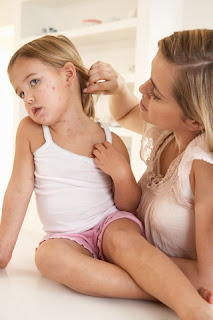For whatever reason, we seem to be
hearing more and more stories about kids getting sick or dying
because of food allergies. In fact, one such incident happened at a
restaurant I worked in when the waiter accidentally grabbed the wrong
bowl of macaroni and cheese and served it to a child with a gluten
allergy. The child recovered because he received emergency care in
time, but it could have been a lot worse. I hope you won't have to
deal with this, but here are some things you should know about food
allergies.
While it's possible for any food to
cause a reaction, here are some common culprits.
- Milk
- Eggs
- Nuts (almonds, walnuts, etc)
- Peanuts
- Fish
- Shellfish
- Soy
- Wheat (which is where gluten comes in)
While you might not be planning on
feeding solid foods to your baby for some time now, it's still
possible to come into contact with allergens if the food or formula
is packaged at the same facility.
It's important to be able to tell the
difference between an intolerance and an allergy. An
intolerance means that your child has problems processing certain
foods. For instance, people with lactose intolerance tend to get
gassy, cramp up or vomit when they drink milk. It usually takes a
good amount of it to cause a problem. There are also lactose-free
milks and formulas. With allergies, however, the reaction is much
more extreme to the point that the body treats the allergen as though
it were a threatening bacteria. Just a tiny amount can cause
reactions that include:
- dizziness or fainting
- feeling of anxiety or restlessness
- swelling of the tongue, face, lips or eyes
- trouble breathing
- eczema, hives and/or flushing of the skin
- diarrhea, nausea and vomiting
One problem with food allergies is that
the reactions can be subtle at first. Symptoms like eczema, vomiting
or diarrhea can be mistaken for something else, but allergic
reactions can get progressively worse with repeated exposure. Also,
babies with food allergies may have problems with growth or
development. If your baby has any sort of reaction to a food or has
other problems that can't be otherwise explained, see the doctor and
ask about testing for allergies. The chances of a child having a
food allergy are higher if you or the child's father have them.
If your baby does turn out to be
allergic to a food, here are some steps you can take to prevent a
possible fatal reaction.
- If your baby is having problems breathing or experiences any swelling, call 911 immediately.
- Your doctor may suggest carrying around an Epi-pen or dose of Benadryl wherever you go.
- Be an obsessive label reader! Like I said earlier, things you wouldn't expect to have certain ingredients can still cause a reaction if they are processed at the same place as an allergen. Also, be very careful about the ingredients you use when you cook.
- Nurse exclusively for six months if possible. If you do breastfeed, avoid whichever food your child is or may be allergic to yourself to prevent your baby from being exposed through breast milk.
These are just a few things to think
about if you think your baby may have a food allergy. As always, your
doctor can give you more information.


No comments:
Post a Comment